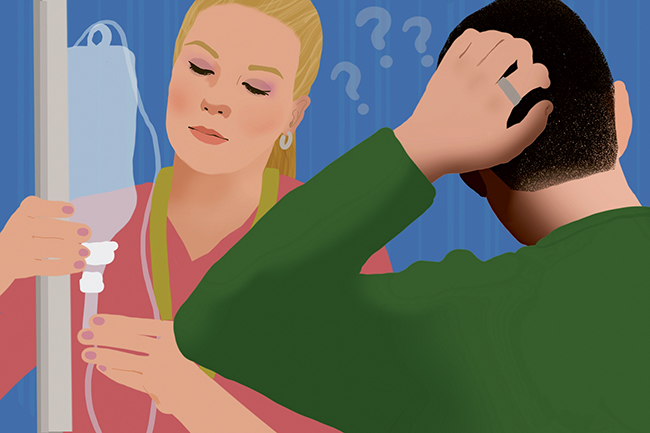Healthy Workforce
Getting New Grads Up to Speed
Close the preparation gap by cultivating a learning culture

Marthe was at her wit’s end after precepting a steady stream of new grads, each seemingly less prepared than the last. In the breakroom, she complained, “I asked this new grad to set up an IV pump, and she looked at me like I was speaking a foreign language. This should be nursing 101!” As the other preceptors nodded in agreement, Marthe added, “I can’t do my job while worrying about whether these newbies know the basics!”
A frequent complaint I hear from nurses and nurse leaders is that recent new graduate hires are the least-prepared they’ve ever seen. To make matters worse, experienced nurses aren’t hiding their negative feelings, responding to new grads’ questions by saying things like, “I can’t believe you don’t know this!” This negativity leaves new grads feeling unwelcome and unsupported. It’s little wonder that so many nurses leave within their first year.
Experienced Nurses Must Step Up
Why are today’s new grads so often ill-prepared to enter the workforce? The pandemic’s disruption of nursing education is partly to blame. Another problem is that the number of clinical placements hasn’t kept pace with record nursing school enrollments, limiting students’ opportunities for hands-on, real-world learning.
It’s falling to the experienced staff at those new grads’ first nursing jobs to give the newcomers the knowledge and skills they need to manage the complexity of patient care. It’s a bad deal for everyone: New nurses are struggling, while experienced nurses are frustrated at having to teach new grads things they should have learned in nursing school.
Here’s the reality: Helping to onboard and orient new nurses is one of the responsibilities of experienced nurses, and has been for 150 years. Is it ideal to have many poorly prepared newcomers entering the profession all at once? Of course not. But sometimes that’s the reality — and complaints, scorn, and blame won’t help.
From a patient safety standpoint, the only thing worse than an ill-prepared nurse is an ill-prepared nurse who’s afraid to ask questions!
That’s why it’s vitally important to create an environment where new nurses aren’t scolded or humiliated for admitting they don’t know something.
Creating A Learning Culture
In her TED Talk, entrepreneur and author Margaret Heffernan explains how to cultivate what she calls a learning culture: establishing helping each other (rather than competing against each other) as an organizational value/expectation.
Organizations that foster a learning culture are more productive and report higher satisfaction. It’s also a great way to support new graduate nurses as they learn, not squash them.
Here are four steps you can take to create a learning culture in your unit or department:
- Respond to complaints by acknowledging and redirecting.
If you hear coworkers complaining about the new grads’ lack of basic skills, acknowledge the complaint by saying something like, “You’re right. Many of these new nurses lack some of the basic skills they should have.” Then, redirect the conversation by saying, “Let’s think about how we can help to get them up to speed.” - Make helping one another “business as usual” for everyone — not just new grads and preceptors.
Take the time to ask your coworkers, “How can I help?” Encourage nurses to jump in when they see that someone is overloaded. (“If you’ve got a minute, I think Hector could use a hand.”) - Focus on three critical skills at a time.
Trying to tackle too many things at once is overwhelming for the learner. Huddle with other experienced nurses, identify three skills the new grads need to master, and then teach those. Once the new grads have got them down, pick three more skills and go from there. - Get everybody involved in the teaching process.
If you’re performing a task using one of the three critical skills, take the time to show a new grad how to do it. This will help to share the load and make new grads feel supported by everyone in the department.
By following these steps, we can create a culture where everyone helps each other to learn, grow, and reach their potential.
RENEE THOMPSON, RN, DNP, FAAN, CSP, is the CEO and founder of the Healthy Workforce Institute (healthyworkforceinstitute.com).
In this Article: Bullying and Incivility, Leadership and Management, New Grads


